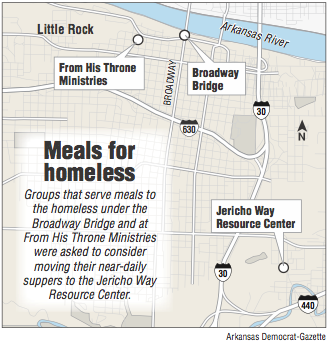Little Rock will forgo adopting an ordinance to crack down on meals for homeless people in city parks, at least for now, and will instead move the location of some of the meals from downtown to a spot about 4 miles away, officials said Tuesday.
The city Board of Directors spent about an hour Tuesday evening discussing meals for the homeless but did not formally vote on a proposal submitted by a volunteer committee that spent about six weeks studying the issue.
Instead, city staff members will immediately begin working to put the committee's proposal in place, Assistant City Manager James Jones said.
Most city directors expressed support for what will be a 90-day trial period that requires the city to place a tent on city-owned property near the resource center Jericho Way. The city will shuttle homeless people back and forth between downtown Little Rock and the Springer Boulevard facility on evenings when dinner is served there.
Ward 4 City Director Capi Peck and other directors thanked the committee for its efforts in turning a contentious piece of legislation into an attempt to better link broader resources for the homeless with meals that are served to them.
"It's not perfect, but it's a beginning," Peck said. "I think this shows, to me, the true nature of our city because I believe we are a city of compassion at the core."
Even directors who had misgivings about the proposal showed little interest in reviving the draft of the ordinance, which had frustrated advocates for the homeless and produced threats of a lawsuit when it was introduced in May by City Manager Bruce Moore.
The ordinance would have required people to obtain a "large group feeding" permit, and pay a $25 fee and a $100 refundable deposit before providing meals to 25 or more people in a city park. Groups could obtain only six permits per year for the city's 63 parks.
The proposed ordinance would have also affected other advocates for the homeless who provide meals in various city parks and for varying numbers of people, according to Aaron Reddin, who founded The Van, a nonprofit that delivers food and other goods to homeless people who aren't in shelters.
Moving some of the meals to Jericho Way will not start for 20 to 30 days, said Jordan Johnson, who chaired the committee and presented its recommendation on moving the meals.
Johnson said the volunteer committee will remain intact to hash out the details, including how to gauge whether the program is successful and working to persuade more faith-based volunteers to sign on to the plan.
It wasn't clear Tuesday how much the experiment will cost the city, but it will fall well short of the $50,000 threshold that would require the Board of Directors' approval for it, Jones said.
The cost of the tent could range from $3,000 to $6,000, and the city's part-time van drivers are paid $12 per hour, he said.
Six groups of volunteers who currently serve dinners at From His Throne Ministries at 1101 W. Markham St. have agreed to move their efforts to Jericho Way on a trial basis, said Elizabeth Dowell, who coordinates the volunteers as part of the Broadway Bridge Project. Others have said they will stay at the church, which organizers say feeds up to 100 homeless people four nights per week.
The proposed ordinance would not have limited serving meals to the homeless at the downtown church, but it would have effectively stopped the groups that serve the food from returning to their regular spot under the Broadway bridge.
That space under the bridge is technically city park space and has been blocked off because of a bridge reconstruction project that is nearly finished.
The six groups each serve one meal per month, Dowell said, meaning that over the three-month trial period they would serve about 18 total meals at Jericho Way.
City Director Erma Hendrix, whose Ward 1 includes Jericho Way and downtown Little Rock, urged Johnson to have the committee meet with people who live near the Springer Boulevard resource center before starting the trial period.
"The impact always seems to come to [Ward] 1," Hendrix said. "We need to wait and see what the residents will do."
Little Rock invested close to $1 million in Jericho Way's building and pays for vans to drive people from overnight shelters to the resource center and back on a daily basis, Mayor Mark Stodola said.
Stodola echoed what homeless people and their advocates told the volunteer committee during its six weeks of research: Finding food is not as difficult as finding employment, housing and mental health care.
"The opportunity to educate the homeless as well while we're doing this feeding and letting them know that those services are available is very, very critical," Stodola said. "It is trying to do more than just feed them."
Ward 5 City Director Lance Hines praised the committee for formulating a proposal that did not require the city to take action through an ordinance.
"I'm a small-government guy," Hines said. "I think the less government can do, the better off we are. If we can self-regulate and do it ourselves without having [city directors] get involved, the better off we'll be."
Moore, who was out of town Tuesday attending his son's basketball tournament, met with the committee in June and expressed support for the trial period, Jones said.
The volunteer committee -- which is made up of business interests, city officials, religious leaders, homeless people and advocates for the homeless -- was formed after city directors called for a more in-depth look at the proposed ordinance.
Its meetings resembled open forums in which its members talked directly with advocates for the homeless who attended the sessions. Also, a subgroup of members met with volunteers who serve the meals.
Metro on 07/12/2017

